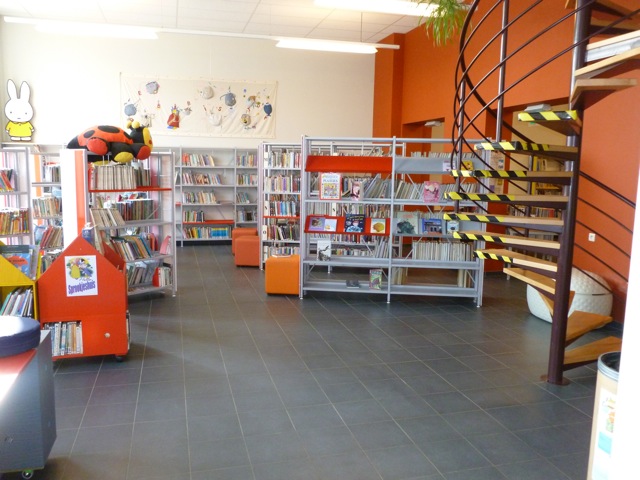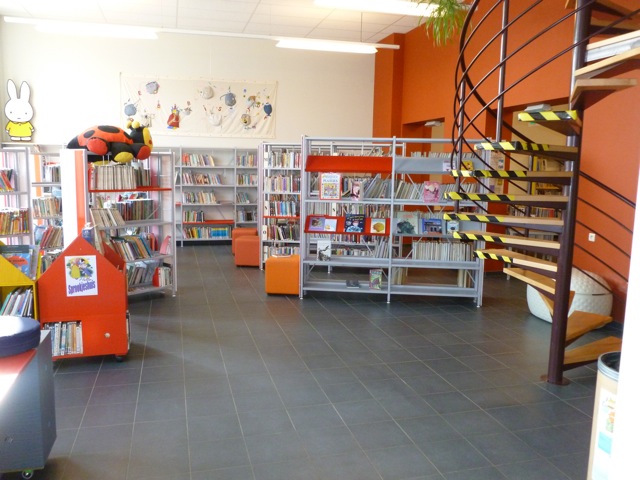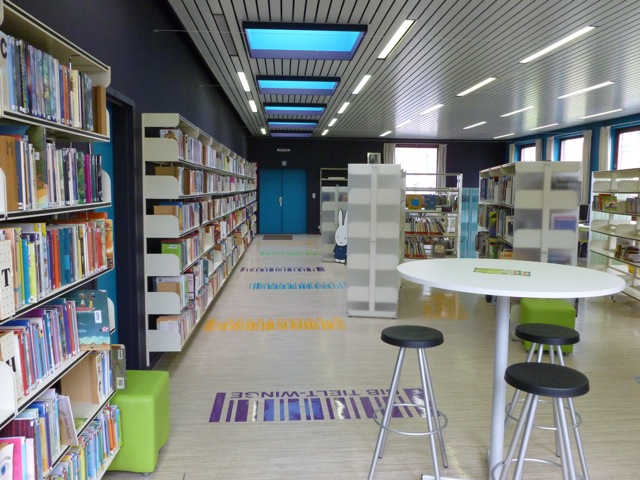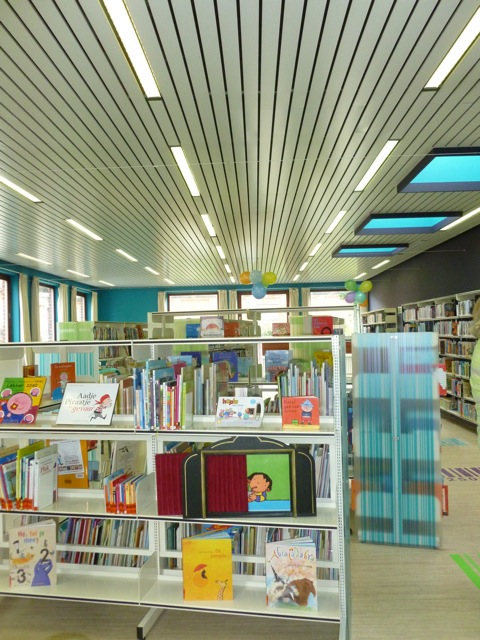Here we come back today with another interview. This time we have Kathleen Dubois from the Library Tielt-Winge from Belgium. It is the first Belgian library to be interviewed!
Bibliotheek Tielt-Winge was the first Belgian library to participate in the programme, and very soon became the sister library of the Krapina Public Library in Croatia. You can read more about all their activities here. And just a few days ago we announced its newest sistership, this time with the Ermua Municipal Library from Spain.
This is already our fifth interview so far! Remember you can read them all in the Interviews Section. Former ones were:
– Aleksandra Zawalska-Hawel, from the Municipal Public Library in Piekary Slaskie in Poland.
– Loly León, from the Arucas Municipal Library in Gran Canaria, Spain.
– Valentina Grinevičienė, from the Kaunas County Public Library, Lithuania.
– Anunciação Gaspar, from the Lousada Municipal Library (Portugal)
And now, let’s start with Kathleen:
-Well, first of all, how did you hear of the sister libraries programme and what motivated you to participate?
In Flanders there is a focal organisation called Locus, especially for libraries and cultural organisations. They told us about two years ago that there was a project called “sister libraries” in Europe and they were looking for libraries in the Flemish part of Belgium. Since I am very interested in other cultures and habits I think this was an opportunity to learn from other librarians and libraries. Maybe I could find some new ideas for my own library.
-Please, tell us a bit more about your community, what is the community you serve like? Which languages are spoken?
Belgium is a very difficult country. We are a very small country but we have 3 official spoken languages, Dutch, French and German. Every part has their own institutions and government level. Tielt-Winge is situated in the Dutch spoken part of Belgium. We are a small, rural community with about 10.500 inhabitants. Tielt-Winge is merged from 4 small villages: Tielt, Sint-Joris-Winge, Meensel-Kiezegem and Houwaart. We have 4 primary schools but no secondary schools.
-We have already seen pictures from different branches of your library, but we would also like to hear more about it. What are your main projects/activities at this time?
Our library has two branches, the main one lays in Tielt and then we have a small branch in Sint-Joris-Winge. This last one is mainly for children because of the neighbourhood with two primary schools. We are at this moment with 5 colleagues working in our library (all of them working part-time, except myself). Last year we organised at least 14 readings with authors for children and adults, we had several low-level computer courses also for children and adults, and a reading competition during summer holidays for children. We also give library introductions for primary schools. For very young children we have every month a storyteller who makes theatre with them.
– Your first sister library was Krapina Public Library from Croatia and very recently you have also established a sistership with the Ermua Municipal Library in Spain. Was it difficult to make a selection from the list of participating libraries? Have you found many differences in the way libraries work in the different countries?
I can only talk about Krapina library at this moment, because the sistership with Ermua is very recent and we didn’t work out things yet.
I “met” Krapina library because Marina sent me an email to ask for a collaboration. She was very enthusiastic about it and of course I was too. We agreed to make an exhibition of our libraries, so when it was my turn – last October – she visited my library. She could stay at my house and we had a very pleasant time. This spring she made an exhibition of my library in Krapina and the I visited her. I had a wonderful time. I was so surprised things were so similar but on the other hand so different. I think the biggest difference was the structure or the relation between library and village.
– Which advantages do you find for a public library to be involved in international cooperation with other libraries, be it in a programme like NAPLE Sister Libraries, or any other?
I think the advances are up to yourself. You see more things, you hear more things, you can discuss things because others see things in a different way. Sometimes you can help with solutions because you have already solved the same problem in your own library and so on. And you find new friends with the same interests! I think this is a very big value!
– Your library is very active in social networks. You have a blog and you have profiles in Twitter and Youtube, –where we recently showed a promotional video created by your library. What advantages do you find in them for the communication with the library users? How have you used them to cooperate with your NAPLE Sister Libraries and/or promote or to give news on your activities?
In Belgium social networks is a very good channel to reach mostly younger people. We have many problems to get them to the library, so sometimes it’s better to go to them.
We try to surprise, that’s what’s the promotional video for. By surprising people you will get them curious and then – I hope so – they want to hear more of your library.
http://www.youtube.com/watch?v=87pH3OmCsSk
http://www.youtube.com/watch?v=87pH3OmCsSk
For example, when I visited the library of Krapina – I wrote an article on our blog and I started in Croatian. Surprise, because nobody couldn’t understand it in Belgium of course!
– Since the main objective of any public library is the service to the community, we would like to know what the reactions of your users to having a sister library have been?
When Marina Smiljanec visited our library for the exhibition, we held an open reception for her, with drinks and everything. She gave to our costumers a very nice traditional Croatian gift. They were really surprised and all of them were very grateful. I think a lot of people went on holiday to Croatia this year!
– What would you say to any librarian who is thinking of the possibility of joining the programme?
As I said, I think it’s about what you want to do with it. There are many possibilities. The talks with Ermua are a little bit different than Krapina. They were looking for possibilities to their French conversation group. But we have to start up everything yet. At this moment we have very big financial problems, two of my colleagues will not be replaced, one is now in the end of the working contract and the other one is seriously ill. We have to make a financial plan for the next six years, it ‘s quite a big job. So I hope I still have time to go on with it.
Related Articles:
- New Activities of Sister Libraries Tielt-Winge (Belgium) & Krapina (Croatia)
- New Sistership! Library Tielt-Winge (Belgium) & Ermua Municipal Library (Spain)
- Meet our Libraries: New Pictures from Library Tielt-Winge, Belgium




28 October, 2013 at 2:48 pm
Thanks Kathleen, for this very interesting interview!
Could you tell us more about these differences that you mentioned in the relationship between library and village?
29 October, 2013 at 9:22 am
Dear Concha,
In Belgium the library is an institution organized by the city or village. It means that they donate money for collection, they pay the salary of the people working in the library, they are the owner of the building where the library is in, we can ask technical support if there is something wrong in the building…. In Croatia this was totally different: Marina said me she had to provide everything by themselves. They had a building from the city but she had to manage everything what technically was wrong with the building. For example last year there was a flooding and there was some damage: she had to seek money to solve this problem. The library get money from the higher “government” but she had to do everything with this. It was much difficult to work in this system I think. I think the support in Belgium is much bigger.